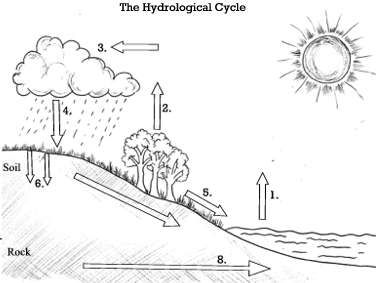What type of pressure system does this represent?
low pressure system
Name this step of the water cycle: when water changes from liquid to a gas
ex: puddle formed in the morning is gone by afternoon
evaporation
this type of air mass forms over the ocean, has warm temperatures, and has brings wet air with lots of moisture
Maritime Tropical
This front is formed when warm air slides up and over cold air. Clouds form with gentle rain or flurries.
Warm
What type of pressure system does this represent?
High pressure system
Name this step of the water cycle: plants releasing water vapor from leaves
ex: water droplets collecting on walls/roof of a greenhouse
transpiration
This type of air mass forms over the ocean, has cold temperatures, and brings wet air with lots of moisture
Maritime Polar
This front is formed when cold air pushes under war air, causing warm air to rise. Thunderstorms, high winds and more severe weather occurs.
Cold
What weather conditions does a low pressure system bring?
cloudy, precipitation
Name this step of the water cycle: water vapor cooling and returning to a liquid
ex: beads of water collecting on glass of ice water on a hot day
condensation
This type of air mass forms over land, has warm weather and has dry air
Continental Tropical
This front is formed when warm air and cold air meet and neither forces other one to move. Clouds form and it may rain or snow for several days.
Stationary
What weather conditions does a high pressure system bring?
sunny, clear skies
Name this step of the water cycle: water falls back to the ground
ex: rain, snow, sleet, hail
precipitation
What type of air mass forms over land, brings cold temperatures, and dry air
Continental Polar
What symbol on a map does this represent?
cold front
a large body of air with similar temperature, humidity, and air pressure
air mass
Name this step of the water cycle: water runs down Earth's surface and collects in oceans and other water sources.
ex: water trickling down a hill back into a lake
run-off/collection
What symbol does this represent on a map?
Warm front
the area where 2 air masses meet but do not mix
front
What is the driving force of the water cycle?
heat from the Sun
What would you expect to happen when a new air mass enters an area?
a change in weather will occur
Label the following diagram with the appropriate terms to describe the water cycle. Only label 1-5 and 8.

1- evaporation
2- transpiration
3- condensation
4- precipitation
5- run-off
8 - collection